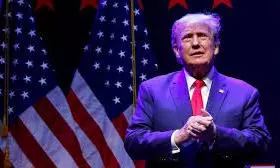AA Edit | Will Trump’s tariff policy undermine US economy?
In response, Trump decided to walk away from the Bretton Woods model, hoping that an isolationist America would thrive economically and industrially;

On April 2, US President Donald Trump is expected to announce reciprocal tariffs against almost all countries in the world, making it an epochal day for the global economy. This announcement will dismantle the US-promoted global economic order based on the Bretton Woods Conference, and the global economy will never be the same again. The Bretton Woods model envisaged an economic order in which the US would act as the global lender, helping other nations in return for their acceptance of its suzerainty.
As countries like China, Japan, Germany, and India — ravaged by World War II or colonialism in the 1940s — developed industrially and technologically, they weakened America's global hegemony. In response, Trump decided to walk away from the Bretton Woods model, hoping that an isolationist America would thrive economically and industrially. However, Trump and his advisers appear to have ignored the fact that the world accepted America's economic leadership in exchange for its role in underwriting global economic stability. If the world has nothing to gain from the US, why would all countries continue to accept the US dollar as the de facto global currency?
The United States, with barely five per cent of the world's population, consumes 24 per cent of global production. However, it also has the largest annual deficit, at $1.85 trillion, and a trade deficit of $918 billion — both metrics indicating that the American economy is sustained by other countries parking US dollars in their central banks as a global reserve currency. Similarly, today’s world is not the same as that of the 20th century, when US domination in technology and innovation was unparalleled. Now, the world will not lack anything in the absence of the US in the global market. China, Europe, Japan, Korea, and India together can easily supplant American companies to meet global demand.
Trump also does not appear to have taken into consideration the impact his policies will have on his people. While he exhorts Americans to bear some discomfort to make America great again, the US President does not seem to have understood the factors that made the US great in the 20th century; America was great because of its innovation. Now, in the 21st century, several countries have developed as innovation hubs, taking away the sheen from the United States. However, instead of promoting science among its people and attracting the best talent from around the world, Trump is turning America into an isolated country that resents non-native talent.
Several countries like Germany, Japan, Korea, and China have gained from the US-led free trade regime. However, even before India could fully take advantage of it, Trump is going to reverse the global order. This would set off panic among businesspeople who have invested large sums of money, as the world would enter a prolonged period of uncertainty after April 2. The Sensex naturally reacted to this by shedding 1,390 points, as investors hate uncertainty. In this tumultuous period, India should reform its economic and administrative systems to make the best of the current situation — either by entering into free trade with the US or by joining a global alliance of like-minded countries to supplant America in the world economy.

